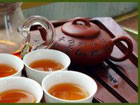| Videos | • Latest |
|
• Feature | • Sports | • Your Videos |
Chinese tea companies face up to stricter EU control measures

 0 Comment(s)
0 Comment(s) Print
Print E-mail CNTV, April 9, 2012
E-mail CNTV, April 9, 2012
China's tea exports face stricter examination when entering EU market
The directive calls for stricter examination of China's tea exports to the EU. Chinese tea may enter the European Union only through specified ports. As well, all goods must have conventional entry documents to enter designated ports.
Additionally, 10 percent of the goods should have on-site inspection and sampling tests for pesticide residues and other items. Regulations are also being imposed on the samples which have no weight limit.
And finally importers will afford all of the fees of the relevant documents prepared for testing and entry.
Fujian passes regional law to transform challenge into an opportunity
Following stricter international standards on the amount of chemical residues it can contain, China's tea production hub, Fujian Province, has passed the first regional law to try to transform the challenge into an opportunity.
Tracking system implemented to ensure quality of Chinese tea exports
Tea growing has a history of thousands of years in China. Now it is benefitting from modern technology. By scanning the barcode, logging into an official website or texting a message, you can easily find out where your tea comes from. This tracking system is the first benefit of Fujian's new legislation which comes into force in June this year.
Wang Wenli, president of Eight Horses Tea, said, "We have been exporting oolong tea to Japan since the 1990s, and we learnt about quality tracking from them. In 2008, we implemented this system for tea production in the domestic market. When we purchase tea from farmers, we have every detail of the tea, including the location, farmer's name and the use of agricultural chemicals."
Like grapes for wine, local conditions are very important for the growth of tea. The weather and soil greatly affect the quality of tea and can mean the difference in price - from less than 100 yuan a kilo to more than 10,000 yuan a kilo.
CCTV reporter Lin Nan said, "I'm in Anxi tea market, the biggest wholesale market for oolong tea in China. At harvest, more than 10,000 farmers sell more than 50 tons of tea a day."
Farmers need to swipe a trading card which contains their personal information to complete a transaction. To make sure the quality of the tea is consistent, modern techniques and equipment have been introduced to the traditional tea manufacturing process. Despite the aim of protecting consumers' rights, the new law might have some unforeseen consequences for small tea businesses.
Tea companies have to change to survive
Gao Qingheng, manager of Fengyan Tea Factory, said, "As a small tea company, we are worried about the impact on us. It means higher costs and a raised market threshold. We may not be able to afford it."
Chen Yongzhong, vice head of Anxi Agriculture Bureau, said, "The new law will change the market. Many small tea companies will have to change, otherwise they won't survive."
Environmental awareness planted in growing tea
Environmental protection is another key point in the new law. Organic fertilisers are to be encouraged and excessive use of pesticides will be banned. So, will the new law be a challenge or opportunity for tea companies? It is too early to tell. But the government hopes it will regulate the industry to make it more sustainable in the long-term.






Go to Forum >>0 Comment(s)